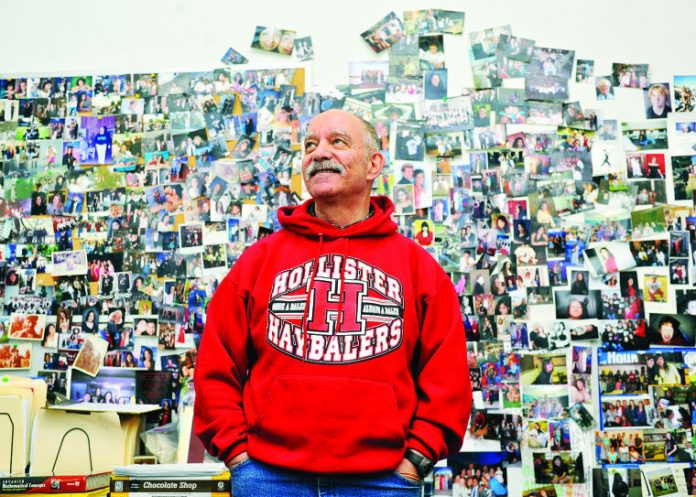
When Jim Caffiero empties his office at San Benito High School at the end of this year, he will be taking along memories of 27 years working with local students. Caffiero, being honored at the Mexican American Committee for Education scholarship banquet Saturday, will retire after nearly three decades of working with high school students.
He arrived on campus in the mid-1980s with the intention of staying for a one-year stint.
“I took a leave of absence from a college in Washington State because I wanted to try my hand at working with teenagers,” he said. “One of my jobs was to bring kids to college.”
He thought spending a year with high school students would help him learn better ways to recruit them to the Washington campus.
“I discovered very quickly it was something that was a lot of fun and really meaningful,” he said. “The leave was for one year and it took me just a couple months to decide I wasn’t going back to my job.”
Estela Lopez was one of the first SBHS students with whom Caffiero worked. She said she was part of an initial class that changed the assignment of high school counselors by grades and, rather, had the counselors stay with the students for their four years of high school. She said having him as a counselor for four years helped her to get to know him, and him to know her.
“He’s probably one of the people I would consider my mentors,” she said. “What I most remember about him is, he’s always been somewhat of a visionary. He has the ability to see students that are going to go on and make a difference in the world.”
She said at the time she attended school, few Latino students were graduating and going off to college. She recalled taking field trips with the counselor many students refer to as “Mr. C” to visit college campuses in the region.
“He really opened our eyes beyond what Hollister had to offer,” she said. “It was his way of planting a seed.”
Lopez, who is one of eight children of farmworkers, had never thought about college.
“I really credit him with helping me recognize that becoming an attorney was a dream that a daughter of farmworkers could achieve,” she said.
After graduating from the University of California, Berkeley, Lopez went on to law school at Santa Clara University.
“All throughout the process and even after I graduated, he was one of my biggest champions,” she said. “He was the first to really identify that that was my calling and he really helped me to answer that call.”
She even invited Caffiero to her wedding and makes a point to stop by the high school to visit him when she is in town.
Lopez said through the years he has worked with students, Caffiero has “maintained that sense of what he does and he does it with a full heart.”
Martin Gonzales, a 2008 graduate of San Benito High School who completed a degree in sociology and communications at the University of the Pacific last in 2012, said Caffiero also helped him find his path.
“I was very confused as to what exactly I wanted to do,” Gonzales said. “I never wanted to be a teacher, but I loved education. He said you don’t have to be on the front lines. You can do administrative work or you could be a counselor.”
Gonzales is working as a site coordinator for the Youth Alliance at R.O. Hardin School as he prepares to go to graduate school for a degree in educational administration and leadership with an emphasis on student affairs.
“I hope to become a principal of a high school or president of a university,” he said, “something that can make a huge, positive impact to help students pursue higher education.”
Caffiero’s influence on current students can be seen in the way they interact with him on campus. On a recent afternoon he met with one student who was so taken with his advice that she had one simple phrase he repeats tattooed on her. It reads, “This too shall pass.”
While he does steer students toward college and academic achievements, Caffiero said many of his days have been spent helping teenagers deal with other issues. He described a typical day as one in which he might talk with a student who is dealing with an eating disorder, another that is struggling with drugs, and yet others that are gay and trying to figure out how to handle it.
He said one of the hardest times for him as a counselor was in 1988 or 1989 when there were 20 student deaths, including three suicides.
“We had kids die of alcohol and drug abuse and in car accidents,” he said. “I spent almost two years mainly doing grief groups. It got to a point where kids said they didn’t want to make friends because they were afraid they would die. It was the most challenging time, handling all that.”
But it is the diversity of the issues he deals with that kept him motivated through the years.
“There are so many different aspects to the job besides just talking about college and setting career goals,” he said. “We have to focus on the personal and motivating kids to believe they can go to college and helping them take the steps they need to get there.”
Caffiero has one wall in his office that is a testament to how many students he has influenced in his time at San Benito High School – it is covered with photos of students and former students.
“It’s generational now,” he said. “I have students in their 40s now who still stay in touch, he said, noting that he has worked with the children of some of his earliest students.
On his Facebook page, his wife asked students and former students to share some memories of their experiences with Caffiero. The responses rolled in and were overwhelming.
“When I was a teenager, it was a tough time for me and I didn’t feel I had a whole lot of adult support,” he said. “I wanted to make a difference for the students here. It is bittersweet.”
Caffiero plans to retire near Yosemite, where he and his wife have a home, with lots of camping and fishing on the horizon.
The man who worked full-time at San Benito High School, taught psychology at Gavilan College and worked for San Benito County’s Behavioral Health Department in his off hours said he might find himself back in the role of a counselor after plans for a full year off.
“I happen to be a veteran and I’ve been thinking about volunteering my time to help veterans,” he said. “My son is an Iraqi veteran and I’m interested in helping this population work through their (Post-Traumatic Stress Disorder.)”









